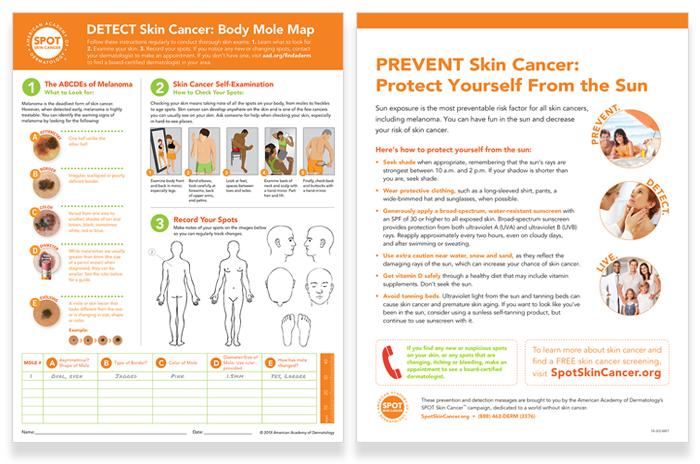May is Skin Cancer Awareness Month, but Columbia Skin Clinic diagnoses many skin cancer cases year-round. We want our patients to have all the facts about skin cancer, so we’ve developed this handy Q&A. Here, we share information about skin cancer types, causes, prevalence, prevention and early warning signs.
Cancer of the skin is the most common cancer, and it affects people of all skin tones. One in five Americans will develop skin cancer by 70 years of age. Use this skin cancer guide to watch for signs of skin cancer and make healthy lifestyle changes to prevent skin problems.
What is skin cancer?
Skin cancer is the uncontrolled growth of abnormal, malignant skin cells on the skin. It occurs in the skin’s upper or lower layer or in pigment-producing cells.
The skin is our body’s largest organ and comprises several layers. The two main layers are the upper layer, called the epidermis, and the lower or inner layer, called the dermis.
Skin cancer begins in the upper layer of the skin in one of three types of skin cells – squamous cells, basal cells or melanocytes. The squamous cell layer makes up the top layer of the skin or epidermis. Basal cells lie beneath the squamous cells. Melanocytes exist inside the basal cell layer.
What are the types?
Basal and squamous cell cancers or carcinomas are the most common types of skin cancer. According to the CDC, approximately 6.1 million adults receive treatment for basal and squamous cell carcinomas annually. Doctors can often cure basal cell carcinoma and squamous cell carcinoma, but these cancers may cause disfigurement.
Melanoma is the third most common skin cancer and the deadliest. Melanoma frequently is more invasive, spreading cancer to other parts of the body, including vital organs. In 2023, the Skin Cancer Foundation estimated that more than half of melanoma cases are invasive and result in nearly 8,000 deaths.
Many forms of skin cancer exist, with some more common than others. Click on the cancer types to learn more about each one:
- Basal cell carcinoma
- Cutaneous T-cell lymphoma
- Dermatofibrosarcoma protuberans
- Melanoma
- Merkel cell carcinoma
- Sebaceous carcinoma
- Squamous cell carcinoma
What does skin cancer look like?
Skin cancer can appear in different ways on the body:
- a mole that appears differently than others on your body or is notably changing
- a scaly patch of skin
- a dome-shaped growth
- a sore that heals and returns or a non-healing sore
- a spot that itches or bleeds
How do I know if I have skin cancer?
Skin cancer looks different on different people and skin tones, and it generally begins where you can see it. It is much easier to treat and cure when found early. Our dermatologists recommend doing monthly self-exams to watch for changes in moles or growths.
Take the time to examine your entire body. That includes parting your hair to check all of your scalp and looking at the skin between your toes and on the bottoms of your feet.
Use these resources when checking your skin:
- If you see any areas of concern, check how they fit with the ABCs of skin cancer signs.
- Read about skin cancer red flags in this article: Are You Missing Early Signs of Skin Cancer?
- Use the body mole map below from the American Academy of Dermatology (AAD) to keep track of spots and any changes. Print it out to use during your self-examinations.

How important is sun protection?
One of the known facts about skin cancer is that ultraviolet (UV) rays from the sun are a major risk factor for developing the disease. The sun and indoor tanning beds expose people to dangerous UV rays. When exposed to the sun, the body’s melanin creates color in the skin to protect it from sun damage. This process is what causes a tan. When there’s not enough melanin to develop a tan, the skin burns. Repeated exposure to the sun’s damaging rays and frequent sunburns can lead to skin cancer.
Skin damage from UV rays is cumulative, growing over time. Many people diagnosed with skin cancer have spent years tanning, and the cumulative effects of UV rays have damaged their skin. Starting sun protection practices now can safeguard you from skin cancer in the future.
What are other risk factors?
Anyone can get skin cancer, but some people are more prone than others. Besides sun exposure, other risk factors for skin cancer include:
Fair complexion – People with fair skin and lighter eyes and hair have a higher risk of developing skin cancer because they have less melanin. Darker-skinned people have more melanin, which prevents them from burning as quickly. However, both light- and dark-skinned people are equally susceptible to damaging UV rays.
Large number of moles – The more moles you have on your body, the greater your risk of developing skin cancer. Individuals with 50 or more moles should be especially diligent about regularly checking their skin. Also, those born with large congenital moles are more susceptible to melanoma later in life.
Family or personal history – According to the American Cancer Society, about 1 in 10 people with melanoma have a family history of the disease. If your close relative has had melanoma, your risk is higher. A family lifestyle of frequent sun exposure, a family trait of lighter skin tones, certain genetic mutations, or a combination of these factors can increase your risk.
Aging skin – Another fact about skin cancer is that the disease commonly appears in older adults. This is likely due to cumulative sun exposure over the years as well as an emphasis on screening and better patient tracking. Most basal cell and squamous cell carcinomas typically appear after age 50. Melanoma cases are more commonly diagnosed in adults ages 65 to 74.
How can I prevent skin cancer?
Since most skin cancer is caused by damaging UV rays, avoiding sun exposure goes a long way to prevent the disease. Here are a few ways you can limit sun damage to reduce your risk of skin cancer:
- Wear sunscreen year-round, even on cloudy days. A broad-spectrum sunscreen with a SPF of 50 blocks 98% of UVA and UVB rays. Wear sunscreen whenever your skin is exposed to the sun, even on a cloudy day.
- Reapply sunscreen every two hours or more often if you are in contact with water or sweating. Even if it says it is water-resistant, no sunscreen is waterproof. If you go swimming, reapply sunscreen right away. Also, make sure your sunscreen covers all areas of your body exposed to the sun.
- Don’t underestimate the protective benefits of clothing and sunglasses. Wear light long sleeves or SPF clothing to protect your skin from sun damage. According to the CDC, sunglasses protect your eyes from UV rays, help prevent signs of aging around the eyes and prevent cataracts,
- Avoid being exposed to the sun during the peak hours of 10 am to 2 pm. UV rays from the sun are strongest in the summer when the sun is closer to Earth. You are most likely to get sunburned and sun damage during peak hours. Stay in the shade when you are outdoors at these times.
- Watch out for reflected sunlight. You can get sunburned even while sitting in the shade by a pool or playing outside in winter due to sunlight reflecting off the water or snow.
- Stay away from tanning beds. Some people think tanning beds are less dangerous than being outdoors in the sun, but that is false. Both natural sunlight and tanning beds emit UV rays that damage your skin, cause premature aging and can result in skin cancer.
- Check your medications to see if they cause sun sensitivity. Some medications, including antibiotics, make the skin sensitive to sun damage. If you take a medicine that causes sun sensitivity, take extra steps to avoid peak sun hours and protect your skin.
- Protect your skin on road trips. Many people do not realize their skin can become burned and damaged through car windows on long drives. Wear sunscreen if you are taking a road trip to protect your skin on the way and at your destination.
Now that you have the facts about skin cancer …
Don’t be discouraged if you’ve already spent much of your life in the sun. Skin cancer is common, but it can usually be treated and cured with early detection.
Properly care for your skin now to minimize future damage and lower your risk for skin cancer. Perform monthly skin checks and schedule annual skin exams with your dermatologist. If you see anything on your body that doesn’t look normal, make a dermatology appointment right away.
We hope you find this skin cancer Q&A informative and helpful. Help us raise awareness by sharing these facts about skin cancer with your loved ones. And read Skin Cancer Awareness Month: Ways to Make a Difference for other ways to get involved.






